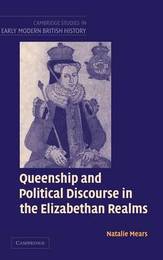
|
Queenship and Political Discourse in the Elizabethan Realms
Hardback
Main Details
| Title |
Queenship and Political Discourse in the Elizabethan Realms
|
| Authors and Contributors |
By (author) Natalie Mears
|
| Series | Cambridge Studies in Early Modern British History |
|---|
| Physical Properties |
| Format:Hardback | | Pages:332 | | Dimensions(mm): Height 229,Width 152 |
|
| Category/Genre | British and Irish History |
|---|
| ISBN/Barcode |
9780521819220
|
| Classifications | Dewey:942.055 |
|---|
| Audience | | Postgraduate, Research & Scholarly | |
|---|
| Illustrations |
2 Halftones, unspecified
|
|
Publishing Details |
| Publisher |
Cambridge University Press
|
| Imprint |
Cambridge University Press
|
| Publication Date |
8 December 2005 |
| Publication Country |
United Kingdom
|
Description
This book re-evaluates the nature of Elizabethan politics and Elizabeth's queenship in late sixteenth-century England, Wales and Ireland. Natalie Mears shows that Elizabeth took an active role in policy-making and suggests that Elizabethan politics has to be perceived in terms of personal relations between the queen and her advisors rather than of the hegemony of the privy council. She challenges current perceptions of political debate at court as restricted and integrates recent research on court drama and religious ritual into the wider context of political debate. Finally, providing the first survey of the nature of political debate outside the court, Dr Mears challenges seminal work by Jurgen Habermas, as well as of seventeenth- and eighteenth-century historians, by showing that a 'public sphere' existed in late sixteenth-century England, Wales and Ireland. In doing so, she re-evaluates how sociologists and historians have, and should, conceptualise the 'public sphere'.
Author Biography
Natalie Mears is Lecturer in Early Modern History at the University of Durham. She has published in the Historical Journal and History.
ReviewsFrom the hard back review: 'Queenship and Political Discourse in the Elizabethan Realms is a thought-provoking study, offering some original perspectives on Elizabeth's style of government, while suggesting avenues for future research.' Annual Bulletin of Historical Literature
|